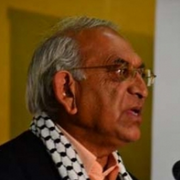
By Iqbal Jassat
South Africa has once again experienced America’s overarching intrusion into its domestic affairs.
The frenzy generated by the US embassy’s “terror alert” raised the specter of bombs unleashed in the heart of Sandton by unnamed “terrorists”, and quickly degenerated into Islamophobia.
Some media platforms hyped the alarm by using so-called “terror experts” who without any shred of evidence, speculated that the likely perpetrators would be Muslims.
Overnight, all forms of “objectivity” was dispensed in their haste to bolster the US alert, instead of challenging the embassy to provide credible proof.
That the “alert” had been disputed by South Africa’s security cluster and doubts raised about its credibility, didn’t seem to deter the “experts”.
Nevertheless, such intrusive conduct by the US in the affairs of sovereign nations remains a matter of concern and problematic.
Though many examples may be cited, perhaps in light of Israel’s recent elections which entrenched its racist political ideology, America’s role in funding and expanding the Zionist regime’s military prowess as an illegal occupier of Palestine, stands out.
Maintaining a firm grip on the Palestinian Authority (PA) via financial blackmail, the US has for decades on end been directly responsible for allowing Israel’s policies of incremental genocide against Palestinians.
Given the mess created by the US in Ukraine and the potential of a nuclear war, it is clear that notwithstanding American propaganda, domestic public opinion as well as in Europe facing a harsh cold winter and exorbitant energy prices reflects exasperation.
Against this background is it possible to envisage an America that relies much less on military spending and deployment and far more on diplomacy and economic development?
Does America need a Congress that is more supportive of arms control and less supportive of modernizing nuclear weapons?
These are some of the questions raised by Melvin A. Goodman, a senior fellow at the Center for International Policy and a professor of government at Johns Hopkins University.
A former CIA analyst, Goodman is the author of “Failure of Intelligence: The Decline and Fall of the CIA” and “National Insecurity: The Cost of American Militarism” as well as “A Whistleblower at the CIA”.
He certainly carries impeccable credentials on the subject of America’s zealous dependence on military power and the financial cost attached to it.
In his recent Counterpunch column, he laments the fact that military spending accounts for more than half of discretionary federal spending.
“Ever since the 9/11 attacks, the United States has relied on increased military power to advance its international interests, spending more than $6 trillion in fighting counterterrorism wars”.
In Goodman’s assessment the Goldwater-Nichols Department of Defense Reorganization Act of 1986 which mandated the White House to produce an annual report for Congress on its national security vision, known as The National Security Strategy (NSS), is supposed to discuss all facets of US power that can achieve the nation’s security goals.
From his strident analysis, he remains unconvinced that America has turned the corner.
“The NSS must discuss US commitments and objectives, along with defense capabilities to deter threats and implement plans. For the most part, the report is a boilerplate document. The Trump administration ignored the requirement for four years, and the Russian invasion of Ukraine led to delays in producing President Biden’s first NSS”.
He goes on to claim that the recent report released by the Biden administration is predictably a “superficial rendering of US plans for global cooperation, but contains no original ideas for the US role in doing so”.
“There is no indication that we have learned important lessons from the isolationist step of withdrawing from the Trans-Pacific Partnership or the militaristic policies in the Middle East and Southwest Asia…”.
In his reading of the current NSS report, Goodman is of the opinion it provides no indication that the Biden administration recognizes the limits to American power, particularly in the current age of uncertainty.
A damning view indeed especially as he correctly argues that though various administrations have tried the same policies vis-a-vis Venezuela, Syria, and North Korea, not Nicolas Maduro, nor Basher al-Assad and Kim Jong-un have bowed to US demands.
Nor has US pressure against Cuba and Iran over several decades of hostile policies including sanctions, succeeded in altering their policies to accommodate the United States.
Goodman’s study holds crucial lessons for South Africa, Palestine, and many other countries subjected to America’s overbearing and aggressive militancy.
Until its dictatorial posture undergoes dramatic changes, rest assured that US policies will continue to destabilize the world in pursuit of acquiring huge profits for its military-industrial complex.

– Iqbal Jassat is an Executive Member of the South Africa-based Media Review Network. He contributed this article to The Palestine Chronicle. Visit: www.mediareviewnet.com







